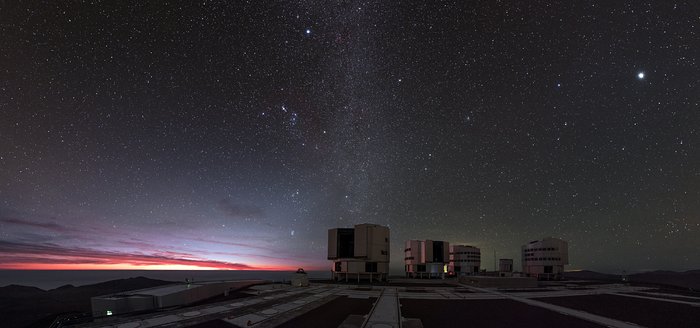Visitez les cieux
Sur cette photographie, prise par l'ambassadeur photographe d'ESO Babak Tafreshii, d’impétueuses couleurs tracent le long de l'horizon près de l'observatoire de Paranal dans le nord du Chili, baignant les quatre télescopes unitaires du Very Large Telescope (VLT) dans une douce lueur.
La Voie lactée semble s’élever directement à partir de l'un des télescopes unitaires, délimitée de chaque côté par une spectaculaire série d'étoiles - y compris Sirius, qui nous éblouit en haut de l'image. Faisant partie de la constellation de Canis Major (Le Grand Chien), Sirius est l'étoile la plus brillante du ciel et est en fait un système binaire, composé d'une étoile de la séquence principale (Sirius A, une étoile à “l’âge adulte” qui brûle de manière stable son combustible nucléaire) et une naine blanche (Sirius B, le cadavre dense d'une étoile qui a terminé son carburant il y a bien longtemps).
Promenez-vous le long de la voie lactée et vous pourrez apercevoir un petit groupe d'étoiles brillantes sur la gauche. C’est la ceinture d'Orion, un astérisme fascinant composé de trois étoiles alignées en ligne droite. Une étoile géante rouge nommée Betelgeuse se trouve à droite de la ceinture, et la lueur rosée de la nébuleuse d'Orion est visible sur la gauche. Ces objets font partie de la constellation d'Orion, du nom du puissant chasseur de la mythologie grecque antique.
Plus bas, devant la face du Taureau et juste au-dessus d'un petit dôme ouvert regardant avec impatience le ciel nocturne (un télescope auxiliaire VLT), quelques étoiles étroitement regroupées sont suspendues au-dessus de l'horizon lumineux. Il s'agit des Pléiades, ou Les sept soeurs, un amas ouvert d'étoiles dominé par des étoiles bleues et chaudes de type B. C’est l’un des amas les plus proches de la Terre.
Crédit:ESO/B. Tafreshi (twanight.org)
À propos de l'image
| Identification: | potw2004a |
| Langage: | fr |
| Type: | Photographique |
| Date de publication: | 27 janvier 2020 06:00 |
| Taille: | 13537 x 6347 px |
À propos de l'objet
| Nom: | Very Large Telescope |
| Type: | Unspecified : Technology : Observatory |
